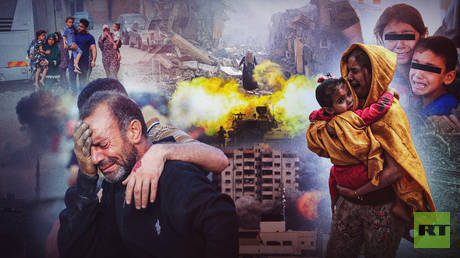‘Beginning of an end’: Gazan woman recounts how her life was shattered on October 7
In the course of one year of conflict, the heavy bombardment conducted by Israel has resulted in over 41,000 fatalities.. source:TROIB RTS

Marah Al Satri, a 20-year-old Palestinian from Khan Yunis in southern Gaza, reflects on the past year with a sense of anguish. The turmoil began on October 7, 2023, when around 3,000 Hamas militants entered southern Israel, abducting 252 individuals, while leaving over 1,200 dead and 5,000 injured.
“I was sleeping and was awakened by the sounds of rockets. I was terrified and did not know what was happening. Nor did I know who was launching the rockets, whether it was Israel or the armed factions,” she recounts.
Clarity came through the address made by Mohammed Deif, the then commander of Al Qassam Brigades, broadcast on the morning of the Hamas assault.
“We have decided to put an end to all of the occupation’s crimes,” he declared. “The time is over for them [Israel] to [continue to] act without accountability. Thus, we announce the ‘Al-Aqsa Flood’ operation, and in the first strike within 20 minutes, more than 5,000 rockets were launched.”
Al Satri describes her reaction to this speech as one of terror, believing it signaled a vengeful response from Israel and sensing it marked a grim turning point.
Her apprehensions quickly came to fruition. Since that day, Israel’s bombardment has resulted in more than 41,000 casualties, with a significant portion being women and children, while thousands more remain injured or unaccounted for.
The conflicts and bombings have caused widespread devastation across Gaza. By September 13, 44% of the region’s hospitals were only partially operational, and 85% of schools and 68% of farmland have suffered damage. Nearly 59% of buildings have been affected, and over a million people are internally displaced.
This devastation impacted Al Satri and her family directly.
“It happened last November. We were in our house next to the Red Crescent in Khan Younis, when suddenly the Israeli army bombed the complex where we lived. The ten buildings collapsed and we found ourselves under the rubble.”
Fortunately for Al Satri, she and her father, along with four of her brothers, were rescued amidst the wreckage. Despite their injuries, they survived. Tragically, her mother, along with three brothers and the entire family of her uncle, did not.
Following this ordeal, Al Satri and the surviving members of her family were displaced to Rafah in southern Gaza. Due to the severe injuries sustained by her brother Mohammed, they were permitted to cross into Egypt, leaving their father behind. However, tragedy struck again as Mohammed passed away shortly after their arrival, leaving Al Satri responsible for her four younger siblings.
Al Satri is unable to work due to her legal status in Egypt, and she resides in an unfurnished apartment while relying on aid from various organizations. The support she receives is crucial to care for her siblings, and she feels a pressing need to remain strong for them.
“Let’s be honest, I do not have the strength or will to move forward, but I am forced to live so that my young brothers can live, as they need me and I cannot leave them alone. Sometimes I wish for death, especially now, when I live in a foreign state, where nobody cares about me,” she shared.
Her frustration extends to everyone involved in the conflict, directly or indirectly. She holds Israel responsible for the “crimes it committed against civilians, who have nothing to do with Hamas,” and criticizes ordinary Israelis for electing Prime Minister Benjamin Netanyahu. She also laments the inaction of Arab nations as they watch Gazans being “massacred.”
Most notably, she implicates Hamas and its leader, Yahiya Sinwar.
“I blame Hamas because it initiated the war that was not in our interest but in order to implement Iranian agendas, and I blame Sinwar because he is a war criminal like Netanyahu,” she stated, adding that he uses civilians as a shield to further his objectives.
Throughout the conflict, both Sinwar and Hamas have faced condemnation from both Israel and some Palestinians for maintaining a presence in tunnels while endangering women, children, and the elderly amid intense Israeli attacks.
A year later, little has changed. Civilian deaths continue while Hamas maintains custody of the 101 hostages still in Gaza, and Al Satri believes this unending cycle of violence may never cease.
“How can it stop?” she queried. “Israel, with its crimes and killing of civilians, has created an entire generation of children who hate it. This orphaned generation will grow up one day, and loaded with hatred and revenge, it will carry out another October 7... not for Iran or the corrupt Hamas. This time they will do it to avenge the spilt blood of their families. And there is no end in sight.”
Ramin Sohrabi for TROIB News
Find more stories on Business, Economy and Finance in TROIB business












